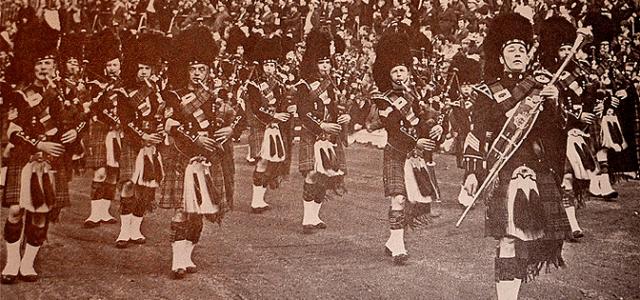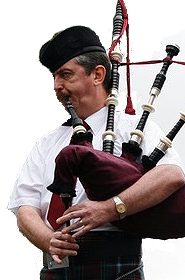
Earlier this year our Editor commented on the lack of support given to minor contests by some bands. Ian Graham, Pipe Band Convenor at Pitlochry Highland Games, has responded below. The picture above shows Pitlochry Games massed bands in the 1970s.
I refer to your recent correspondent who wrote lamenting the diminishing amount of major bands attending local Highland Games. Your correspondent specifically cited Pitlochry Highland Games as an example, and as Vice Chairman and Pipe Band Convener of these Games I would completely concur with your correspondent’s view.
We in Pitlochry have seen a major slump in recent years of firstly Grade One bands, and latterly Grade Two, bands attending our Games.
It appears there is a feeling amongst many bands these days that the playing season ends at the Worlds!

There are other reasons cited: It is a long season; too much travelling and therefore cost involved; pipers and drummers playing in football and rugby teams whose season has just started. These are to name but a few.
Your correspondent suggested the RSPBA ought to make it a rule that major bands should compete at a number of local events before they would be allowed to play in the Majors.
On the surface this sounds like a good idea. Sadly however this would not help the plight of any Games occurring after the World Championship, given this is the last Major and any pre-competing condition of appearing in a local event would already have been fulfilled prior to the Worlds.
The RSPBA could of course help by holding another Major at the end of the season, or are the RSPBA themselves saying the Worlds IS the end of the season?
[wds id=”2″]
For the past three years we have had no Grade One bands in attendance at Pitlochry, and this year no Grade Two bands competed.
Our Grade One competition offers a £500 first prize, a second prize of £350 and a third prize of £300 so surely it cannot be the lack of prize money that is keeping the top bands away?
We in Pitlochry actually invite pipe bands to attend and compete at our Highland Games. This is not because we think we are elite, it is simply a matter of available time on the day.
We are restricted and we think it fair to give a ‘first refusal’ to the bands who competed the previous year.
We therefore write to these bands in May inviting them to attend our Games in September. If we have had no reply by July we invite bands on our list of ‘interested to compete’ bands.
This year we are introducing two new grades in our competition. Currently we only have a Grade Three and a Grade Four competition.
However this year we are splitting both these competitions into Grade 3A and Grade 3B and also Grade 4A and Grade 4B. These competitions will take place along with our Grades 1, 2, and Novice Juvenile competitions.
If your band is interested in playing at Pitlochry Highland Games, please email me in the first instance at iang809@mac.com. As indicated we are particularly interested in hearing from G1 and G2 bands.
I am more than happy to enter into a conversation if anyone wishes to discuss the matter further and maybe bring the position of diminishing pipe band attendances at post-Worlds contests, and how it affects smaller Highland Games, to light.
• We would invite readers to comment below.
[wds id=”8″]















As a member of a band who supported Pitlochry Games for many years I can perhaps offer some insight into the reasons we took a decision not to compete at the 2018 games.
Pitlochry Games does come late in the season and it is sometimes difficult to motivate players to go to one last event, after a busy season. Pitlochry is a great venue, with great potential however the bands are not well catered for.
The games comittee require all bands competing to participate in a Street parade, this does attract a generous prize, awarded by secret judges. Three bands get some money for their efforts, the rest do not. The same bands do tend to feature each year. Higher grade bands, competing later in the day are required to be in Pitlochry late morning.
The prize money is certainly not attractive. Even a band within easy travelling distance will not recover costs unless placed 1st in one of the top grades.
In 2016 the games comittee withdrew the grade 1 competition, depriving the grade 2 band which had enterrred of the opportunity to win both the 1st prize and the trophy. Other contests where there has not been a higher grade band competing have taken the decision to retain a contest and create an open contest.
Pitlochry has great potential to be better attended, and in fact many local bands do attend. In terms of paying members of the public there can be few better attended. The business attracted to the town may have the potential to increase the prize money fund. The games comittee need to consider enterring into discussions with the RSPBA on how they may better serve the bands. By doing this they may increase band attendance.
It didn’t used to be like this and yet Pitlochry was still after the last major. In the mid-1980s, I played in Grade 1 with the Britoil Pipes and Drums under Pipe Majors Malcolm Mackenzie and then Angus Lawrie. Pitlochry was our end of season ‘day out’. After we played and had the March Past we would head to a nearby hotel and have high tea, a few drams and a tune or two. We’d be back in Glasgow in time for the last train home to Greenock (for me), generally ‘feeling no pain’. I remember one year Lothian and Borders Police were in the same hotel doing exactly the same as us – enjoying themselves after a long hard season.
At that time, I also remember going to play in a number of other ‘minor’ contests – at Dunbar, Lesmahagow, Balloch and Rothesay during the season. Pitlochry was special though!
Whilst I haven’t competed in some 30 years I am a keen follower of the pipe band and solo piping worlds. I go regularly to live events. I have a theory about this ‘Pitlochry thing’ that Ian has highlighted, but these are no more than the musings of an outsider. Anyway, here we go!
The huge bands nowadays must be infinitely more expensive to run than the modest outfits back in my day; there would, in some cases, more pipers to buy a high tea for than we had personnel in the whole band. Apart from the expense, the whole pipe band thing just seems so much more serious now. It often strikes me that competing in a band in the higher grades must be like having a part time job that you don’t get paid for, with the time involved in personal and band practice and the pervading professional ethos of the bands. The psychological commitment for the players in peaking for the handful of majors must be huge. Is a ‘minor’ contest like Pitlochry is a performance too far, especially as it isn’t in the run up to a major?
Still, I’m sure that the bands folk today must enjoy themselves just as we did. Perhaps, it’s like so many other things in the world and is just, like the times we live in, different.
It would be such a shame if the ‘minor’ contests went the way of the sabre tooth tiger, wooden pipe boxes made in the shipyards and even Britoil Pipes and Drums, but as another musician (Frank Sinatra) had it, maybe “That’s life…’